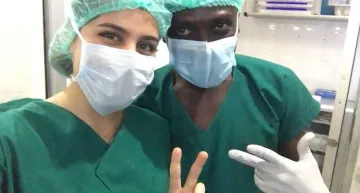
This past semester, I had the opportunity to travel abroad to Ghana to volunteer with Unite for Sight, a non-profit which
partners with local ophthalmologists in underserved countries to identify community-specific barriers that impede effective eye care delivery for patients living in extreme poverty. During my time in Ghana, I worked with local optometrists and ophthalmologists to determine visual acuity, dispense and distribute eyeglasses and medications, and interact with 100-200 patients daily in villages, refugee camps, churches and schools.
Twi is the primary dialect spoken in southern and central Ghana. As I traveled to different cities such as Kumasi, Techiman and Tema, I spoke with the locals in my broken Twi and began to slowly learn some of the language. The Akan people of Ghana frequently name their children after the day of the week they were born and the order in which they were born. These "day names" have further meanings concerning the soul and character of the person. While there, I was known as “Yaa,” meaning born on a Thursday. The Ghanaian people are among the kindest and most hospitable people I have ever met. By giving me this name, I was included in their cultural traditions and felt very welcomed.
Throughout the trip, we traveled to various historical sites and natural attractions while sampling local food and munching on tropical fruit (the best mangos and bananas I have ever had in my life!). One of the most memorable experiences was when we attended the Independence Day parade. On March 6th, everyone in the entire country leaves their homes and goes out into the streets to celebrate. Dancing with the locals, eating fufu soup with my hands and unsuccessfully trying to play the Kpanlogoon drums made the experience all the more memorable, and the friendly ambiance facilitated the formation of relationships with friends that I am still in regular communication with today.
Beyond the obvious cultural and linguistic differences, it was fascinating to learn about the different sociological discrepancies between the society I grew up in and the one I visited. In the US we have a monochronic society, where time is thought of as being linear. People are expected to do one thing at a time, and lateness of interruptions are not tolerated. The people of Ghana live in a polychronic society, where time is cyclical, and punctuality is not as highly stressed. As such, the people living there have more relaxed and laid-back attitudes and outlooks on life. Living in this more fluid lifestyle exposed me to a different perspective from what I was used to and allowed me to adopt parts of their lifestyle to my own to cope with the stresses and pressures of everyday life.
My experiences with the Ghanaian people’s humbling realities, vibrant culture and rich communal relationships stripped away all superficial notions of differences and reminded me that through understanding and tolerance, our human oneness becomes blatantly obvious. This trip reinforced my willingness to try new things and adapt to unfamiliar circumstances despite the discomfort and hesitation I had felt. I intend to take my experiences with individuals with differing views and backgrounds than my own to constantly remind me that though there are substantial differences in the way we live our lives and perceive the world, we are all ultimately similar. I will surely remember this trip to Ghana for the rest of my life.
Here’s a link to my video that I made of my trip:
https://www.youtube.com/watch?time_continue=3&v=_hcN3sLQTCE






